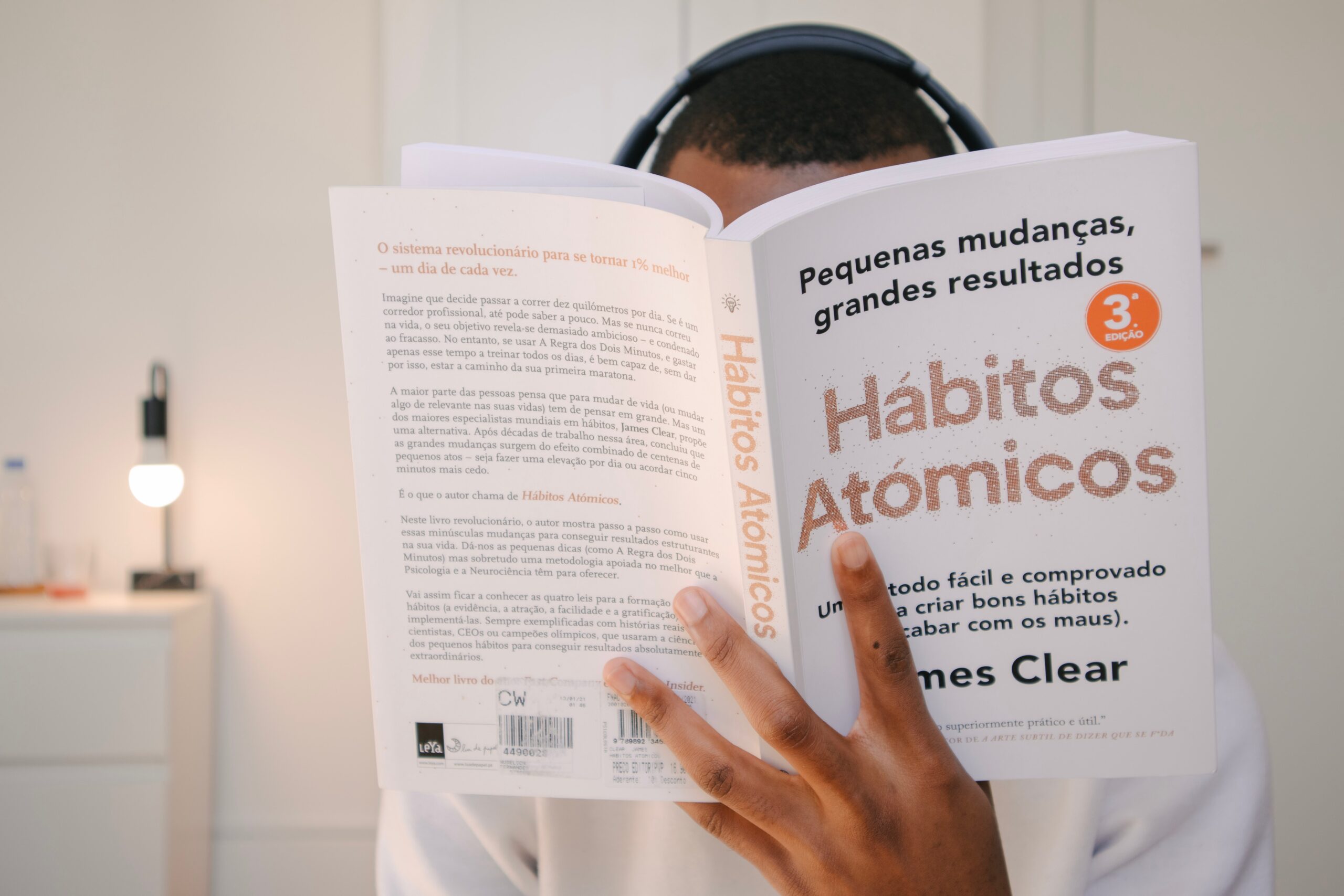Building lasting habits can change your life in the long term.
Yes, sticking to your habits can be challenging sometimes. Especially when you feel demotivated to even get up from your bed.
But with the right system, you can make these habits a part of your life. A process that you enjoy doing every day.
And remember, everything is hard before it’s easy.
I mean … do you remember the first time you drove your bike? You feel like it’s the most difficult thing in the world. You even feel surprised how all these people are doing it easily without thinking about it.
But with practice, you realize that you only need time to make the process easy.
The same goes for habits.
You decide to read a book or go for a run because you watched a motivational video or read an article about the benefits of reading or journaling every day. You feel motivated, you do it for few days, and when the motivation is gone, the new habits are gone with it.
The reason why most people can’t stick to their habits is that they’re doing it for motivation, not for the long-term outcome. Don’t read books because you feel motivated, read books to become smarter.
This article will guide you through the process of building lasting habits without feeling overwhelmed. The steps mentioned here are very easy, but effective.
So let’s start, shall we?
Start small
Now that you decided to build good habits, it’s about doing it the right way.
When feeling motivated, most people try to start big from day one. They want to run a marathon, read 30 books and become an athlete in 1 week.
When they realize that things don’t work like that, they give up.
Look, building lasting habits requires 1 important thing: Patience. I heard once a quote from the famous Youtuber Ali Abdaal where he said, “Enjoy the journey before destination”.
If you want to run a marathon, enjoy the process of running every day.
If you want to read books, enjoy the journey of getting smarter every day.
Here’s the catch now, you can’t enjoy the journey if your steps are longer than your legs. Here’s what I mean: Stand up and try walking with long steps. Throw your legs to the farthest point you can. How long do you think you can walk like that before getting tired? Probably not too long.
The same thing goes with habits.
When you want to build lasting habits, you need to start small. Take baby steps.
Your system shouldn’t be to read for 3 hours every day from the beginning. Instead, try reading 2 pages every day. It’s a small step and an easy process. Everyone can read at least 2 pages, right?
The point here is to trick your brain that you only need to take 2 minutes to read these 2 pages. Surprisingly, after a while, you will find that you enjoy reading books and you will go beyond these 2 pages. Apps like Systemize can help you build systems like this.
So the first step is to start small. What’s next?
Don’t miss twice
After few days of working on your new habit, you may get busy or forget to finish your habit.
These things happen. But it shouldn’t happen twice.
“The first mistake is never the one that ruins you. It is the spiral of repeated mistakes that follows. Missing once is an accident. Missing twice is the start of a new habit”.
– James Clear
It’s okay if you missing your habit once, but make sure not to miss it twice, because that’s where most people give up.
Always get back to the track quickly. The power of taking small steps is that you can always find time for your habits. You can always find time for a 10-minute walk or to read 2 pages.
If you combine these 2 techniques, your habits will last longer than most people.
So did you miss your habit yesterday? Make sure to work on it today.
Make it daily
Taking small steps consistently is better and more effective than taking huge steps once a month. So when you start a new habit make sure to work on it daily or at least 5 days a week.
This way, your habits will be a part of your identity. It won’t be something you do because you have to. Your habits will become a part of who you are.
I know that you may be busy or have a lot of responsibilities to read daily or go for a run every single day. That’s why the first tip in this article is to take small steps.
Try tweaking your habits to fit in your daily routine. Maybe wake up 15 minutes early every morning to go for a 10-minute walk. Or take 5 minutes from using social media to read 2 pages.
If there’s a will there’s a way.
Increase your habits over time
Reading 2 pages every day will get you into the habit of reading, your goal is to increase this number every month or 2 months. Whenever you feel that your current habit has become a part of your routine, try to push forward a little bit. So instead of doing 2 pushups try doing 5.
We don’t want to push too much or too often. There’s no fit-all formula for how much is too much or too often, it’s up to you to decide depending on your routine and how you feel.
The reason why we increase our habits over time is to improve ourselves. You start small, you improve, until you start doing big things easily.
Most people try to skip the first step and jump to the last step but they fail. It takes patience, but it’s worth it.
Make it a part of who you are
If you make it to this point then I assume you’re serious about building lasting habits.
The next tip is to make your habits a part of your identity. Some people have a habit of smiling when they say “Good morning” to someone. They didn’t work on it, it’s a part of who they are.
Making a habit part of your identity will make them stick with you forever because this is who you are now. You’re now a reader, not someone with a goal of reading 10 books. You’re now a writer not someone with a goal of writing a book.
You want to build identity-based habits instead of outcome-based habits.
An Outcome-based habit is to read 30 books in 1 year, an identity-based habit is to become a reader. Outcome-based habits will relate your happiness to the end goal, so you will only feel happy when achieving this goal. Identity-based habits will make you happy now.
So why wait till the end of the year to become happy? Be happy now.
Don’t try to be a perfectionist
We’re not perfect. We have mistakes. We try to do things but we give up before reaching our goals.
The reason is that we try to be perfectionists. We want everything we do to be 100% perfect. Someone once said, “Perfectionism is self-abuse of the highest order”.
Leonardo Da Vinci spent 12 years painting the Mona Lisa’s mouth! Do you want to do that?
Probably not.
So if you want to become a writer, it’s okay if your articles are not that good yet. Everything is hard before it’s easy. Keep going and you will reach excellence one day.
Compete against friends
Research shows that having a partner to work with on your habits helps you stick to them longer than working alone. That’s why it’s a good idea to have someone with whom you can share your progress over time. You can motivate each other and help each other get back on track when feeling demotivated to continue.
Use habit stacking
Habit stacking is adding a new habit to a current habit. For example, if you have a habit of drinking tea every morning, you can stack a new habit of reading 2 pages while the tea is preparing.
Habit stacking goes like this: “After [CURRENT HABIT] I will [NEW HABIT].
It’s an effective way to find time for your new habits. I discussed this idea in detail in my last article.
Do it for yourself
Do it for yourself, not for people.
Trying to impress people is not worth it. The only person you need to impress is yourself. Especially when you do something you always thought you’re incapable of doing.
Run because you want to improve your health not to become famous. Read books because you want. to become smarter not to impress your friends.
Give yourself a reward
You made it to the end of this article, you deserve a reward for that. Most people will leave before reaching half the journey.
When you finish a habit, your reward is that feeling of satisfaction. Especially when you know that 90% of people gave up before reaching this achievement.
If that’s not enough for you, you can treat yourself to something you love like playing video games or going out with friends.
If you’re using a habit tracker, your reward is that sound you hear when you tick the checkboxes or the long streak you built over the last months.
It’s up to you to decide your reward, but remember, it needs to be instant. Because instant rewards will make your brain relate finishing this habit with that feeling of satisfaction when you receive the reward.
New habits should feel easy, especially in the beginning. If you follow these 10 tips you will build more lasting habits than most people.






